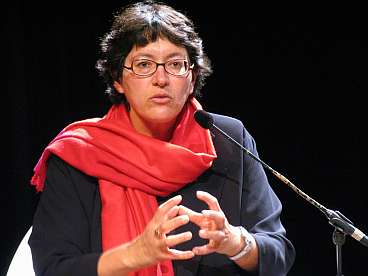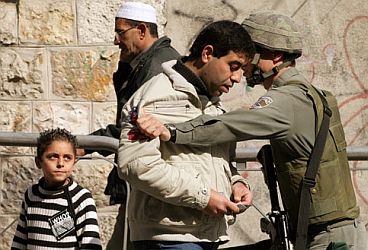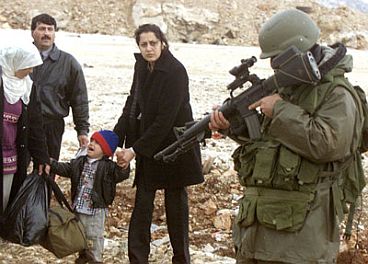
Te gast: Amira Hass
16-01-2008, Haaretz
Lees verder


Te gast: Amira Hass
16-01-2008, Haaretz
Lees verder
(Op de foto: Haniye, Abbas, Dahlan, 15 februari 2007)
Als service, voor de echte doorzetters die willen begrijpen wat er gebeurt in Palestina. Een reeks van artikelen, helaas in het Engels (hadden we maar een snel vertaalbureautje), van oude vertrouwden als Michael Warschawski en Amira Hass, van Robert Fisk, van de onovertroffen Electronic Intifada die heel snel met uitstekende analyses kwam. Van psychiater Eyad Sarraj uit Gaza zelf.
Lees verder
Sacrificing the Palestinian struggle
By Amira Hass
Fifth column, traitors, collaborators – this is what Hamas spokesmen call those whom they hold responsible for the civil war in the Gaza Strip. They point to a “treacherous stream in the Fatah movement,” warning that Palestinian Authority Chairman Mahmoud Abbas is “incapable of taking control of it.” They are referring to Mohammed Dahlan and his associates.
Lees verder

(Een Palestijn uit Jeruzalem wordt niet doorgelaten als hij wil gaan bidden. Foto Electronic Intifada)
In 1948 werden ze verdreven, de mensen van Beit Latif, een Palestijns dorp in wat nu Israel heet. Ze kwamen terecht in te oude stad van Jeruzalem. In 1966 werden ze opnieuw verplaatst, door de Jordanese regering waar Oost Jeruzalem toen nog onder viel, en de VN. Er werd ze beloofd dat ze betere behuizing zouden krijgen. In vrachtwagens werden ze naar een vluchtelingenkamp gebracht, Shuafat. Van de beloftes kwam niets. In Shuafat kamp wonen nu 20.000 Palestijnse vluchtelingen, binnen de stadsgrenzen van Jeruzalem. Ze hebben het blauwe identiteitsbewijs waarmee ze in ieder geval nog een paar rechten hebben, al valt het niet mee. Ook al betalen ze belasting, net als alle andere Jeruzalemieten, de stad doet niets voor het vluchtelingenkamp en laat het over aan de VN om te zorgen voor scholen en medische zorg. Zelfs de vuilnis wordt door de VN opgehaald. Nu worden ze voor de derde keer verdreven.
Lees verder

By Amira Hass, Haaretz
Anyone who wants to become acquainted with Israeli society should go to the checkpoints. Not for a quarter of an hour, under the guidance of commanders who will glory in the pavilion they built for the people waiting in line and will explain that the upgrading and the expansion of the checkpoint are intended to benefit the locals. Those who really want to know the checkpoints should rather dwell here for hours, during several days. When you observe the soldiers, you will discover many Israeli characteristics among them, characteristics in which we have always taken pride.
Lees verder
The checkpoint generation
By Amira Hass Haaretz
For nearly a month now, a young Palestinian has been hospitalized at Beilinson Hospital; soldiers shot him at a checkpoint in northern Nablus on Saturday, November 4. Haitem Yassin, 25, is conscious now, but he is still hooked up to a respirator. In recent days, he has been suffering from a high fever, apparently caused by an infection in his abdomen, which was wounded in the shooting. His family is still waiting for a report from the hospital about the number or type of bullets that caused the serious injury.
Lees verder
http://www.haaretz.com/hasen/spages/786928.html
By Amira Hass
The first shell that struck the house sent up a big cloud of dust and smoke. The parents and older children felt around in the sudden darkness of the morning, looking for the small children – to see if anyone had been hurt, to find and hold them, to run with them into the street.
Lees verder
Te gast: Amira Hass
Haaretz
NABLUS – Out of the dark appeared a taxi, and behind it another and then another. Each of the drivers in turn slowed down, waved to the driver coming from the opposite direction, from the east, and told him that there was no point in driving any further. Even without him saying, they knew what the cab driver between the villages of Tel and Sara to the west of Nablus was doing: Like them, he was looking for fuel there last Monday. Yakub the driver had two passengers, young men holding empty jerricans in their hands, hoping to find a single gas station that would sell them 10 or 20 liters.
Lees verder
Ik heb al enige tijd niet geschreven over Gaza. Misschien omdat het op dit moment zo ongelooflijk ontmoedigend is en ik bijna niet meer weet wat ik er nu nog over zeggen moet. Het was er erg. Het is er nog erger. Waar iedereen bang voor was en iedereen, behalve Israel, van hoopte dat het niet zou gebeuren dreigt nu echt. Geweld tussen Hamas en Fatah. Mijn vrienden zijn ook stil, en voornamelijk bezig te overleven en hun kinderen in veiligheid te houden. De berichten die doorkomen maken moedeloos. Terwijl het werk van het NCCR voor de gehandicapten zelfs onder de meest barre omstandigheden doorging zijn er nu echte moeilijkheden. We willen er weer heen, in november. Als het kan. Als het niet te gevaarlijk is geworden. En als we de grens overkomen.
Ondertussen schrijft Amira Hass, een van de beste Israelische journalisten door. Dit is haar laatste artikel over de situatie in Gaza.
Lees verder
Israel probeert zoveel mogelijk Palestijnen uit de Westoever en de Gazastrook te laten vertrekken. ‘Vrijwillig’, zodat er geen haan naar kraait. Geheel in de consistente lijn die regering na regering heeft gevolgd: hoe krijgen we zoveel mogelijk land met zo min mogelijk Palestijnen er op. Een manier om dat te doen is om gezinshereniging te voorkomen, en zelfs tegen te gaan dat een partner met een ander dan een Palestijns identiteitsbewijs wordt toegelaten om de wederhelft of de kinderen te bezoeken.
Lees verder